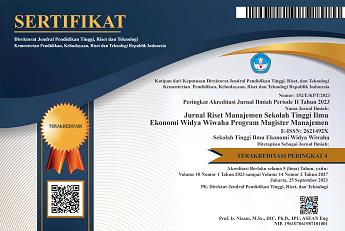MOTIVASI KERJA KARYAWAN UNIT TRANFUSI DARAH PALANG MERAH INDONESIA KOTA YOGYAKARTA
DOI:
https://doi.org/10.32477/jrm.v6i2.11Keywords:
work motivation, employee,, UTD (Blood Transfusion Unit), PMI (Indonesian Red Cross)Abstract
The problems examined in this study are how efforts should be made to increase the motivation of the employees. The study was conducted at the Blood Transfusion Unit of the Indonesian Red Cross (UPTD PMI) Yogyakarta, aiming at finding what efforts should be made to improve the motivation of the employees.The method used in this research is a close-ended question questionnaire employing a five-point scale of Likert and an open-ended question questionnaire. Data analysis method used is qualitative descriptive analysis. The data used are primary data obtained through questionnaires. Respondents of this study were employees of the blood transfusion unit (UTD PMI) of Yogyakarta city, numbering 35 people. The result shows that the perception of the motivation of the three aspects had an average value (grand mean motivation) of 3.2, which, according to the frequency table, is sufficiently good. Employees would eagerly carry out their jobs due to the satisfaction of their needs consisting of the existences of impulses, achievable hope, and rewards. Data from the open statements reveal there is a tendency from respondents to desire salary adjustment, communication, infrastructures and facilities for their works, safety and comfort while on duty, pleasure from working, and work rules which produce a rise of motivation while working. Research result and conclusion point out that employees’ motivation for working can be improved by conducting evaluation.
References
Achua, L.F.C., Feldman, D.C (2004). Managing Individual Are Group.Behavioral in Organization. New York : McGraw Hill.
Aida Vitayala S. Hubeis, (2012), Epectancy Theory, program pasca sarjana Manajemen dan Bisnis Institut pertanian Bogor.
Anwar Prabu Mangkunegara. 2005. Evaluasi Kinerja, Refika Aditama, Bandung.
Business, Memotivasi Karyawan. www.kwary.net/Memotivasi%20Karyawan.ppt(pdf), (di akses 20 septamber 2016)
Chihnongadi Mulyowiyono (2009), “tentang Analisis faktor-faktor yang berpengaruh terhadap kinerja pegawai di Kantor Pelayanan Pajak Pratama Parepare”, Tesis Magister Manajemen, Universitas Hasanudin Makasar.
Danim, Sudarwa (2004), Motivasi Kepemimpinan dan Efektivitas Kelompok, PT Rineka Cipta, Bengkulu.
Dinus.ac.id/repository/docs/ajar/Motivasi-dlm-Organisasi.ppt, Motivasi Dalam Organisasi (pdf-dinus.ac.id), di akses pada 8 juli 2016.
Deniyati Zufriah (2014),”Analisis Deskriptif Tentang Motivasi dan Kinerja Karyawan KUD Sadar Sejahtera Beliti Jaya Kecamatan Muara Kelingi Kabupaten Musi Rawas”, Skripsi Sarjana, Universitas Bengkulu.
Dessler, Gary (2007), Manajemen Personalia, Edisi Ketiga, Erlangga, Jakarta.
Feryy-roen (2012), teori-motivasi, http://perilakuorganisasi.com/teori-harapan.htm, (di akses 28 Oktober 2016).
Fuad Mas’ud (2004), survey diagnosis Organisaional Konsep & Apikasi, Badan Penerbit Universitas Diponegoro Semarang.
Harsey, Paul and Ken Blanchard 2002, Managemen of Oranizational Behavior Utilizing Human Resources, New jersey, Prentice-hall Inc.
Hasibuan, S.P. Malayu (2007), Organisasi dan Motivasi: Dasar Peningkatan Produktivitas, Bumi Aksara, Jakarta.
Hendry (2013), motivasi dalam pendekatan diagnosik https://teorionline.wordpress.com/01/26/, (di akses 28 Oktober 2016).
Moleong, Lexy J (2004), Metode Penelitian Kualitatif, Perusahaan Remaja Rosda karya, Bandung.
Naufan Sapoetra (2015), Cara-mneghitung-Kuesioner-Likert, blogspot.co.id, (diakses 24 Januari 2017).
Roen, ferry. 2013. Teori Harapan. http://perilakuorganisasi.com/teoriharapan.html, (diakses 12 oktober 2016).
Siagian, Sondang P (2005), Analisa serta Perumusan Kebijaksanaan dan Strategi Organisasi. Jakarta : Gunung Agung.
Sugiyono (2010), Metode Penelitian Bisnis (Pendekatan Kuantitatif, Kualitatif, dan R&D), CV Alfabeta, Bandung.
Uma Sekaran (2006), Metodologi Penelitian untuk Bisnis, Salemba Empat, Jakarta.
Yusrizalfirzal pengertian-instrumen-penelitian http://.wordpress.com/tag, (di akses 15 September 2016).








